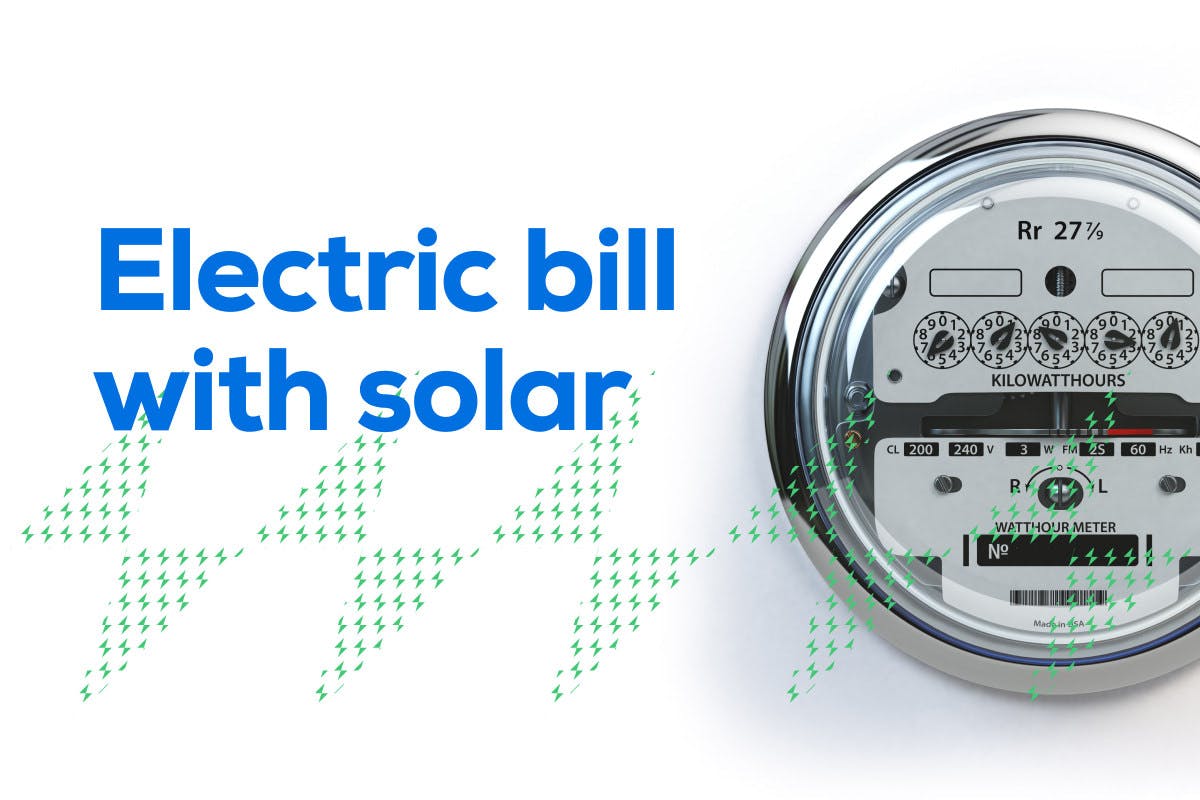There are many reasons to go solar, but most homeowners do so because of the savings solar panels can deliver. Home solar panels can reduce your electric bill, but claims about having no bill or making money on your power aren’t right the vast majority of the time.
Home solar power can give you clean energy and steady savings month after month, but you’re still likely to get an electric bill once your panels are up and running. We’ll help you understand why and how much of a bill to expect.
See how much you can save by going solar with Palmetto
4 Reasons You’ll Still Have an Electric Bill With Solar Panels
Let’s get this out of the way first: Unless your home is totally off the grid (an extremely rare and expensive scenario) you will still receive an electricity bill every month.
It’s a common misunderstanding that you will no longer have an electric bill if you install home solar panels. Even with solar there are four main reasons why you’ll still get a bill.
Nights and cloudy days
The main reason is simple: Your solar panels need the sun to generate electricity.
Not only is it not sunny every day of the year, but the sun goes down every single night. In other words, unless you plan to never use electricity at night or on stormy days, your home will still need electricity from the utility grid. Thus, the average homeowner will still get an electricity bill each month, even if their solar panels produce electricity at maximum efficiency.
Going solar while still being connected to the grid means getting the best of both worlds: solar when it's available, and additional energy when you need it.
Utility service charges
Since you’ll want to use electricity in your homes even if your solar panels aren’t producing it, the vast majority of residential solar panel systems are connected to the utility grid. Being “grid-tied” means your home can draw electricity from the grid when its solar panels don’t produce enough electricity.
Being connected to the utility grid means you will receive a utility bill. Your bill might include various utility service charges on top of electricity prices, and some are charged regardless of how much electricity you use.

Credit: Florida Power & Light
The actual fees depend on your local utility company, but can include:
- Customer service charge: For meter reading, account maintenance, billing, customer service, and general utility operations.
- Distribution charge: For building and maintaining the electricity distribution system, including transformer stations and power lines.
- Transmission charge: The cost of high voltage transmitters used to carry electricity from the generating station to your home.
Lack of solar battery storage
When you have a home solar energy system, there can be times it generates more electricity than your home needs, especially during peak sun hours. If you have solar battery storage installed, you could save that excess electricity production and use it at night.
However, even if you have battery storage, you’ll typically want to stay connected to the grid. Having enough battery storage available to power your home for extended periods of time can be expensive. It’s usually better to have some battery power ready for typical use, with the grid still available as a backup in case you need more power.
If you don’t have a solar battery storage system installed, you won’t be able to use that extra energy at night, which means you’ll have to draw it from the utility grid. And that means you’ll get charged for that usage.
Lack of net metering
Net metering is a utility billing program that allows you to get credit for your excess solar generation. Whenever your solar panels generate more electricity than your home needs, that excess energy is sent to the utility grid. Your utility company or electricity provider then credits your account for that amount of electricity.
The value of this credit varies and depends on your utility company, the net metering terms it has set, and your electric rate. However, you can use those credits to offset the cost of electricity you pull from the grid in the future.
If your utility company doesn’t have a net metering program, you won’t be able to earn any credit for your extra electricity. Thus, when you draw from the utility grid at night or during stormy days, you will have to pay for that usage, instead of having the credits cover it.
Average Monthly Electric Bill With Solar Panels
How small will your electric bill be after you install solar panels? That can depend on several factors.
Utility company fees
Your utility company will still send you a bill containing electricity charges that cover customer service and delivery fees. Some will be flat monthly charges, while others take into consideration your total electricity usage. Before going solar, it’s smart to ask your utility company which charges you will be billed for, even after installing solar.
Solar offset
Solar offset is the measurement of how much electricity your solar panels produce in relation to the amount of electricity your home uses. Many systems are designed by the solar company with a solar offset of 100%. A 100% offset means the amount you use and the amount your panels make are equal when measured over an extended period of time.
Typically, the higher the percentage of energy you consume from your solar system, the lower your monthly electric bill will be.
Local weather conditions and seasonality
The amount of energy your solar system produces also depends on the weather conditions in your area and changes in available sunlight throughout the year known as solar seasonality.
For instance, if your location often gets a lot of cloudy days, your solar panel system might not generate enough electricity to meet your home’s typical energy consumption needs. As a result, you are likely to rely more on the electricity grid than someone living in a sunnier climate.
If you live in a place with seasons, you’ll get more sun and solar production in the summer and less in the winter. Net metering credits you bank in the summer can help cover wintertime bills but may cover all of them.
An reputable solar company should design your solar system with these factors accounted for.
See how much you can save by going solar with Palmetto
Amount of power your home uses
The number and types of devices and appliances in your home will impact how much power you use. If your solar system doesn't produce enough power to run these devices, you will rely more on the utility grid, affecting the cost of the electric bill you get each month.
In addition, your power consumption and usage habits might have changed over time, making it so your solar system is unable to meet your increased energy needs.
Your system not working as it should
While this is a rare occasion, your solar system might not be generating electricity with maximum efficiency. To avoid issues, you can:
- Check your solar monitoring app to see how much energy your solar system is producing and compare it to historical averages.
- Contact your solar panel company to troubleshoot your solar system and get everything running properly again.
How to Lower Your Electric Bill With Solar Panels
Ultimately, the relationship between your solar panels and the size of your electricity bill will depend on how much electricity you use and how much you generate. While you can’t control how much electricity your solar panels generate, you can take a few measures to lower your electric bill with solar panels.
Reduce your energy usage
Making your home more energy efficient is a good idea whether you’re switching to home solar power or not. Here are some more ideas about upgrading to energy-efficient appliances and overall energy-saving tips for around the house.
- Use a smart thermostat to ensure your heating and air conditioning system is only on when you need it.
- Use smart lights and LEDs instead of incandescent light bulbs.
- Carry out a home energy audit to assess your energy usage, improve your energy efficiency, and cut down on costs.
- Always turn off appliances and devices when not in use.
- Improve your insulation and block places air can leak in or out of your home.
Install solar battery storage
If your solar panels often generate more power than your home uses, you could invest in solar battery storage to capture that excess electricity. Solar batteries can maximize the potential of your solar panels, storing excess generation throughout the day, so you can use it at night or during cloudy days instead of power from the utility grid.
Enroll in net metering
Where it’s available, net metering allows you to send your excess power to the utility grid in exchange for credits on future electric bills. You can then apply that credit to the electricity you draw from the utility grid at night or during bad weather.
Yes, You Will Have an Electric Bill With Solar Panels
In theory, you could eliminate the “electricity” portion of your electric bill if:
- Your solar panels operate at maximum efficiency.
- Your home uses less electricity in the daytime than your solar panels generate.
- Any excess generation is stored in solar batteries and/or sent back to the utility grid with net metering.
- Your home uses less electricity at night and on cloudy days than you have in your batteries, or you have net metering credit to cover that use.
However, even in a perfect solar offset situation, you will still have an electricity bill after installing solar panels because of mandatory utility company fees. You can never fully guarantee you will achieve a perfect offset every single billing cycle, so in almost all cases, it makes sense to stay connected to the electric grid. That means you will still have the utility’s required fees every month.
Luckily, by lowering your energy usage, investing in battery storage, and enrolling in net metering, you could pay a much smaller energy bill with solar panels than without them.
If you're ready to install solar panels to help offset energy costs and lower your electricity bill with renewable energy, you can get started today with our free design and solar savings estimate tool to see how much you might save by going solar.
See what solar can do for you:
Frequently Asked Questions
How do I know if solar is right for me?
There are factors we look at to determine if solar might be a good solution for your needs. This includes roof space, home energy usage, utility rates, credit health, and eligibility for incentives. At Palmetto, we start by calculating a savings estimate based on your home, location, and current electricity costs. We will work with you on options based on your goals and the specifics of your home. All of this happens before you buy, allowing you to decide if solar is right for you.
What if my electric bill is pretty low already?
Electricity rates vary by location and some American households benefit from low monthly costs. That said, electricity rates are generally on the rise, and the environmental costs of relying on fossil fuels remain. Our solar savings calculator can help you estimate potential savings based on your location and current monthly electricity costs.
What does “off the grid” mean?
A home that’s “off the grid” is not dependent on public utilities. That said, wherever grid electricity is available, we recommend maintaining a connection. This allows you to source power from the grid when your solar panels don’t meet your demand.
 Andrew GiermakWriter and Editor
Andrew GiermakWriter and EditorAndrew joined Palmetto in Charlotte in August 2024. He’s been a writer in journalism, then in business, going back to almost the 20th century. He’s lived in Indiana, Virginia, Pennsylvania, Virginia again, and now North Carolina for the last 12 years. He likes golf. Is he good at it? Not so much.

